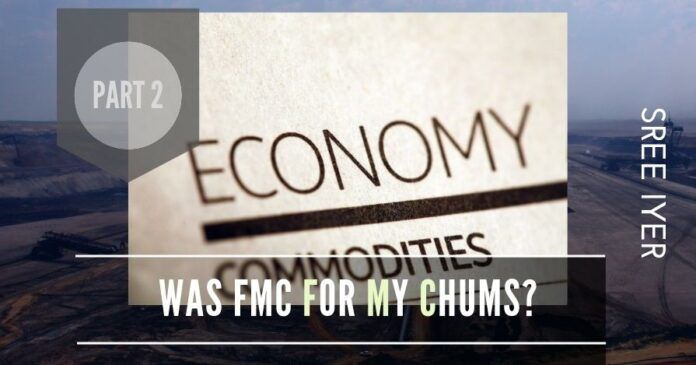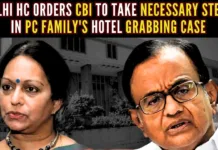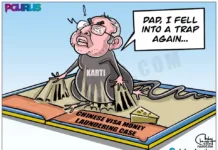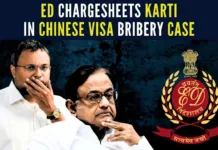
Part 1 of this series can be accessed here. This is Part 2.
FMC – Forward Markets Commission or For My Chums?
Ignorance or Impetuosity – call it whatever you want – Ramesh Abhishek’s role as the regulator of FMC will go down the annals of history as a manual for how not to do a job. While the list of omissions on his part is long, I will present just five.
His period at the FMC has been marked by nepotism, favoritism, bias, vindictiveness, incompetence and inefficiency which did great damage to the spot commodity trading system.
- Ramesh Abhishek failed to protect the commodity market ecosystem by not articulating enough about the potential ill-effects of the Commodities Transaction Tax (CTT) that proved to be a big dampener for the growth of commodity derivatives business.
- Despite receiving complete information on the business of spot exchanges every fortnight, he did not raise any concerns on any aspect of the functioning which he later made into a big issue when attacking NSEL and leaving other exchanges doing similar business.
- Despite having powers, never bothered to check brokers records of trading at NSEL.
- He called a meeting of all stakeholders on August 4 2013, got assurances from them and expressed satisfaction of solving the problem. Then he suddenly made a U-turn, and began attacking only NSEL and its promoters completely overlooking the role of key players in trading namely brokers and defaulters.
- Neglected the prime duty of a regulator to pursue defaulters when a payment default happened due to his own rash actions.
Commodities Trading Tax
How atrocious the reign of UPA was can be understood from how it tried to impose a tax on electronic trading of Commodities. This tax, to be levied on a select group of commodities was opposed tooth and nail by the whole commodity futures sector. Yet, after several failed attempts, Chidambaram succeeded in getting the CTT passed in the Union Budget of 2013[1]. Here comes the evil genius part – only Bullion, Base Metals, Crude Oil and Processed farm items were levied this tax – all of which were being traded for the large part on the Multi Commodity Exchange of India (MCX) that belonged to Financial Technologies Group (now 63 Moons). The competing exchange NCDEX did not get affected much because its market share in these commodities was small[2]. The trading of agriculture sector was spared of this tax. The only conclusion one can draw from this is that Chidambaram and C-Company were playing favorites and the Regulator was playing their errand boy picking up and punishing the promoters of FTIL and leaving out other main players such as brokers and defaulters. See Figure 1 for details.
It is shocking that Abhishek, as regulator did not see the harm this move would create.

Spot Exchanges
Spot Commodity Exchanges allow for immediate trade of Commodities. The sale typically happens within two days[3]. Because of this, the price of a spot commodity has more exposure to supply and demand pressures within the market than futures contracts. Plus the fact that some of the commodities could be perishable (e. g. vegetables/ fruits etc.) means there could be volatility in spot prices.
The Department of Consumer Affairs (DCA) approved three Commodity Spot Exchanges to function in India – The NSEL, the NCDEX Spot Exchange and National Agriculture Produce Marketing Company of India Ltd, Ahmedabad. Because of the price sensitivity involved in trading at Spot exchanges, it was vital that the Regulator (FMC) check the veracity of the fortnightly reports of the Spot exchanges. Not only that, surprise checks should have been conducted to ensure that the numbers matched the claims on the inventories in the warehouses and godowns. Nothing of that sort ever happened. For that matter, he was not doing anything expected of a regulator despite the Government delegating specific powers of collection and review of periodic information submitted by the spot exchanges and investor interests etc.,
All three spot exchanges were given the same set of exemptions under Section 27 of the FCRA. Yet the FMC, the then commodity markets regulator, misrepresented facts to the Department of Consumer Affairs (DCA) by alleging that NSEL was violating certain terms and conditions of FCRA. Why was NSEL singled out? What about the other Spot exchanges?
The FMC recommended, wrongly, to the DCA to issue a show cause notice to NSEL, which it did, on April 27, 2012. NSEL promptly replied to the show cause notice but there was no response for one and half years as DCA and FMC went quiet. There were no follow up questions, not a peep. But suddenly, on July 12, 2013, it issued a letter to the NSEL asking it to stop issuing any future contracts and to settle existing ones in accordance with their respective maturities. NSEL could have gracefully unwound all the positions in a timely manner. What should have been a confidential communication between the regulator and the exchange, was leaked deliberately with a perverted objective (something that the evil genius is good at), leading to a huge rush on settlements, eventually leading to the defaults.
Regulator failed to act fairly
After the proverbial excrement hit the rotating air-generating mechanism mounted on the ceiling, Abhishek called a meeting of all stakeholders on August 4, 2013. Everyone present admitted to their positions and promised to pay their full dues in installments over the next twenty weeks. But soon after what seemed to be a strange and sinister move by any regulator, he suddenly made a U-turn and began attacking only NSEL and its promoters completely overlooking the role of key players in the trading namely the brokers and defaulters. He also did not pursue payment of claims made by the defaulters – essentially he washed his hands off. The objective never was to recover dues – it was to harm and humiliate Shah and his group of companies. Once the mission was accomplished, FMC was quickly merged with the Securities Exchange Board of India (SEBI). Was it a face-saving measure for Ramesh Abhishek?
His period at the FMC has been marked by nepotism, favoritism, bias, vindictiveness, incompetence and inefficiency which did great damage to the spot commodity trading system. The eco-system got so debilitated that the activity in spot market trading seen till 2013 has not been reached, even after five years.
Continued…
References:
[1]C-Company machinations – Part 10. How Chidambaram continues to rule over Fin Min – Dec 1, 2017, PGurus.com
[2]C-Company Part 4 – How Chidambaram tried to control all Financial markets in India – Nov 11, 2017, PGurus.com
[3]Spot Commodity – Investopedia.com
- Indian Parliament’s Special Session is convened to mark the shifting to new Parliament building - September 3, 2023
- Why did Rajat Sharma of India TV not declare that Adani owns more than 16% shares in his channel? - January 29, 2023
- Prannoy Roy to get Rs.605 crore from Adani as per Stock Exchange filing. Why is Income Tax not acting on Roys’ dues of over Rs.800 crore? - January 4, 2023











Here’s a sorry attempt by Ramesh Abhishek pretending to be an upright officer (https://prime.economictimes.indiatimes.com/news/68766159/corporate-governance/ramesh-abhishek-who-got-india-a-boost-in-ease-of-doing-business-has-been-put-in-the-dock-heres-why-the-charges-are-untenable-?utm_source=https://economictimes.indiatimes.com&utm_medium=dailynewsletter&utm_campaign=ETprimedistribution&ncode=b2f07bc067691d5c). One wonders what the author was offered to write that article and paint that ridiculous picture of him apparently being an honest civil servant. They conveniently ignore his political connections, underhanded dealings and arrangements and personal assets in his name and in the name of his family and associates such as L K Agrawal. He has been given a free reign for too long, time to bring his corruption out into the open and let the world know his true colours.
[…] exchange NCDEX did not get affected much because its market share in these commodities was small[2]. The trading of agriculture sector was spared of this tax. The only conclusion one can draw from […]